Physical Address
304 North Cardinal St.
Dorchester Center, MA 02124
Physical Address
304 North Cardinal St.
Dorchester Center, MA 02124
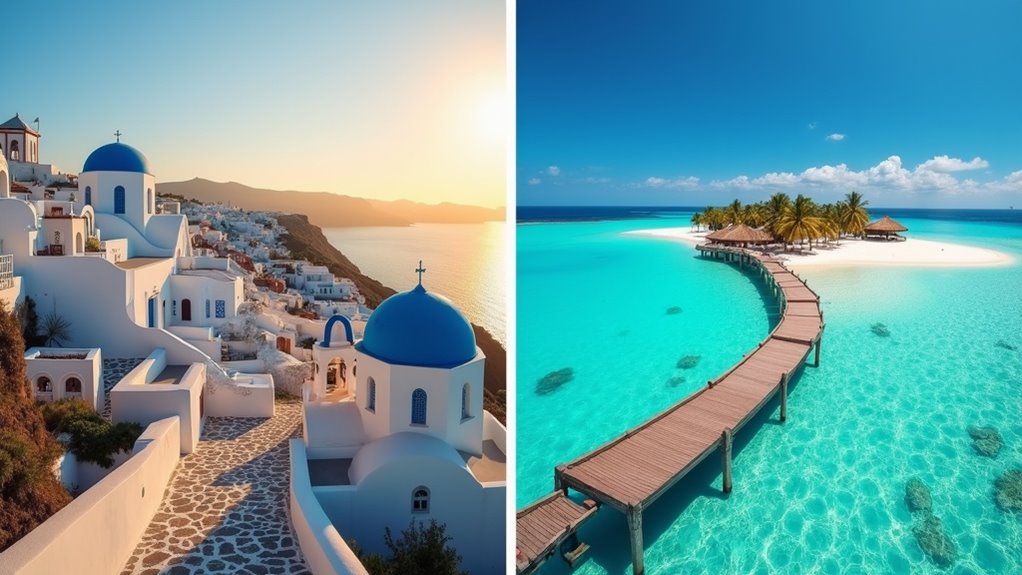
Between ancient ruins and overwater villas lies your perfect escape—will you choose Mediterranean charm or tropical paradise?
You’re staring at flight options, caught between two dream destinations. Should you wander through Greece’s ancient ruins and hillside villages, or sink your toes into the Maldives’ powdery white sand? One offers culture with Mediterranean flair, the other promises overwater villas and turquoise lagoons. Your perfect getaway depends on what you value most—historical exploration or tropical seclusion, island-hopping adventures or underwater discoveries. The choice shapes not just where you’ll go, but what memories you’ll bring home.
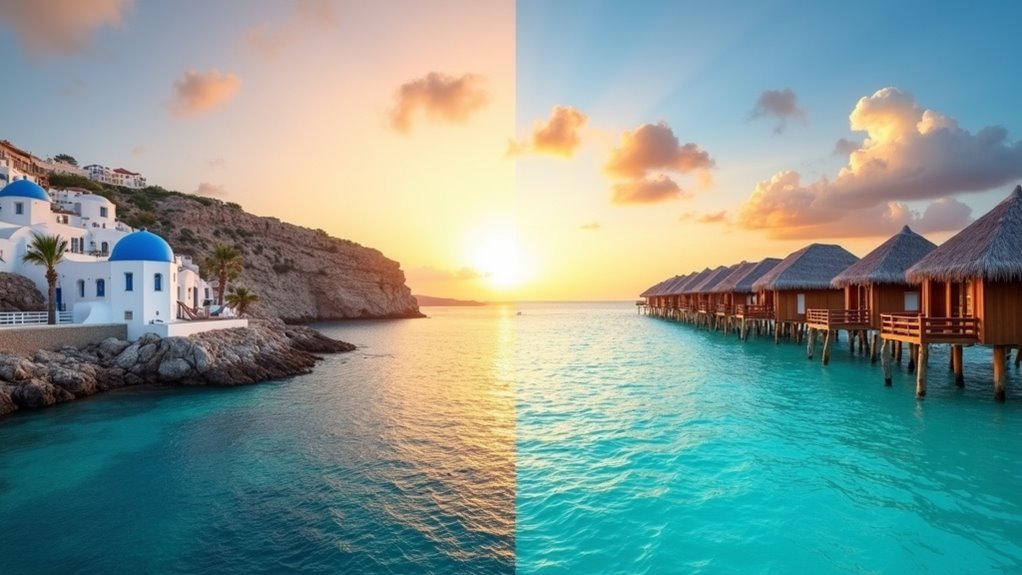
When choosing between Greece and the Maldives, climate plays a decisive role in your travel experience. Greece offers Mediterranean seasonality with temperatures swinging from 9°C in winter to 28°C in summer, while the Maldives maintains a steady tropical warmth of 27-28°C year-round.
You’ll find Athens actually peaks hotter in July (28.29°C) than the Maldives (27.81°C), but the Greek islands benefit from cooling sea breezes that make evenings comfortable.
The Maldives’ high humidity amplifies heat sensation despite consistent temperatures.
Greece concentrates rainfall in winter months, giving you dry summer adventures, while the Maldives experiences heavier precipitation (1,900mm annually versus Greece’s 370mm), particularly during the southwest monsoon from May to November. Athens receives minimal rainfall throughout the year, with July being the driest month at just 0.23 mm.
For climate diversity, Greece offers varied microclimates across its mountainous regions and islands. Athens provides an ideal dry climate for exploring historical sites that have stood for thousands of years, which would be impossible to find in the tropical Maldives.
Choosing between Greece and the Maldives ultimately comes down to whether you value culture or exclusive privacy. Greece offers unparalleled historical opulence with over 100 museums and UNESCO sites like the Acropolis.
Your travel preference reveals your true values—cultural exploration or secluded luxury.
Meanwhile, the Maldives delivers secluded luxury with overwater villas and private island resorts.
In Greece, you’ll interact with locals at tavernas serving regional specialties. Learning a few essential Greek phrases can significantly enhance your cultural experience and connection with locals.
In contrast, Maldivian resorts operate separately from local communities, focusing on personalized service with high staff-to-guest ratios. With a population density of 1,102.5 people per square kilometer compared to Greece’s 81, the Maldives feels more intimate despite having excellent infrastructure.
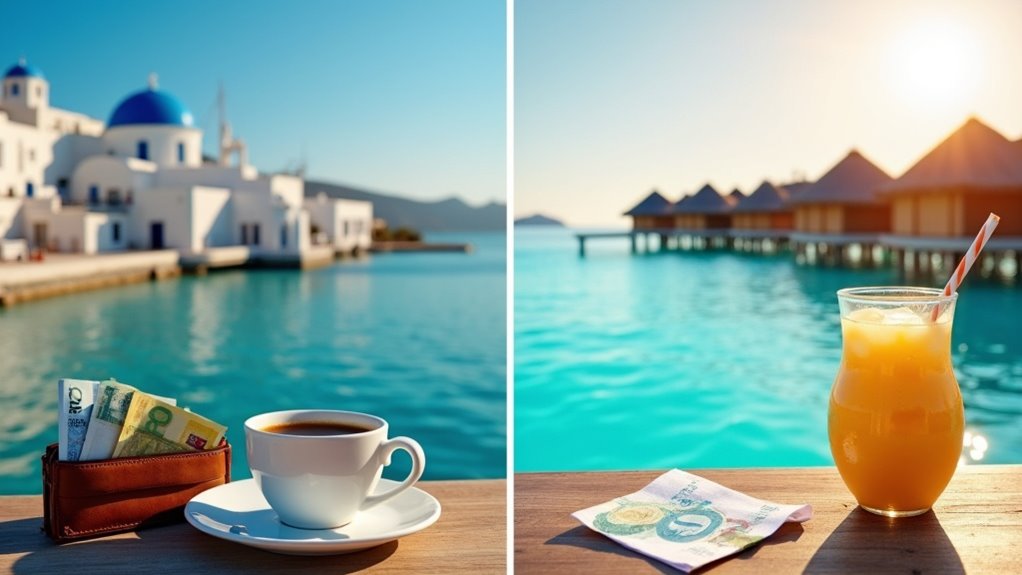
Five distinct cost factors reveal why Greece typically offers better value for most travelers. Accommodations in Greece cost substantially less, with downtown apartments priced at €484 versus Maldives’ €1,098 – an 81.4% difference.
While utilities run higher in Greece, your overall housing burden remains lighter.
Greece’s mainland infrastructure reduces transportation costs, eliminating expensive seaplane transfers between islands. The local transportation ticket in Greece is significantly more expensive at 20.89Rf compared to Maldives’ 10.00Rf cost.
Though Maldives offers cheaper restaurant meals (33.9% lower), Greece’s superior grocery affordability and stronger purchasing power benefit longer stays.
Monthly living expenses in Greece average $1,105 compared to Maldives’ $1,399.
With Greece’s extensive mid-range lodging options and lower baseline costs, your budget stretches further, allowing more discretionary spending on experiences rather than necessities.
For example, visiting Kefalonia island gives you access to stunning beaches and Greek culture at prices much more affordable than typical Maldives resorts.
Timing your trip strategically can dramatically impact both your experience and budget when deciding between Greece and the Maldives. Greece buzzes with energy June through August, with temperatures reaching 35°C—perfect for beach lovers but expect crowds at popular islands.
The Maldives shines December through April, offering ideal diving conditions and consistent sunshine.
For maximum value and enjoyment:
The Maldives maintains a steady tropical climate with temperatures hovering around 28-30°C year-round, even during the low season months.
Crete, Greece’s largest island, offers an excellent extended season with pleasant weather from April through October, making it an attractive alternative to more crowded Greek destinations.
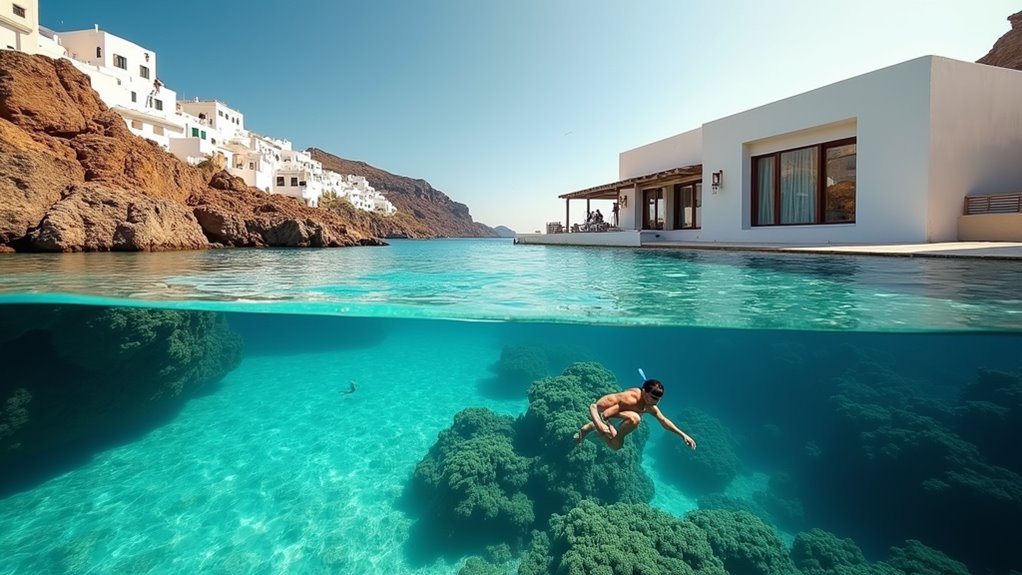
While dreaming of perfect beaches remains alluring, both Greece and the Maldives offer remarkable adventures beyond their sandy shores that can transform a relaxing getaway into an unforgettable journey.
Beyond pristine sands lie transformative adventures waiting to elevate your vacation from relaxing to truly extraordinary.
In Greece, you’ll discover diverse landscapes perfect for exploration. Hike among ancient monasteries in Meteora, traverse Crete’s challenging Samaria Gorge, or trek Mt. Olympus National Park. With 21.1% of 2023 visitors drawn to active experiences, you can enjoy rafting, cycling, and wildlife exploration in areas home to endangered species like kri-kri goats. Greece has seen a significant increase of 12.1 percentage points in active tourism motivation since 2019.
For eco-conscious travelers, vehicle-free islands like Hydra offer sustainable experiences, while Tilos showcases renewable energy innovation. The Greek islands provide stunning snorkeling opportunities with crystal-clear waters perfect for underwater exploration.
You’ll find opportunities to engage with local culture through artisan workshops and traditional festivals, adding cultural depth to your outdoor adventures.
Food serves as a gateway to understanding a destination’s soul, and the culinary journeys awaiting you in Greece and the Maldives couldn’t be more distinct. Greece offers a Mediterranean bounty of olive oil, feta, and herbs in dishes like moussaka and souvlaki, while the Maldives presents an oceanic feast centered around tuna and coconut in specialties like garudhiya and mas huni. Greek culinary traditions are often enhanced by traditional clothing attire which adds to the authentic dining atmosphere of local tavernas.
Your taste buds will discover:
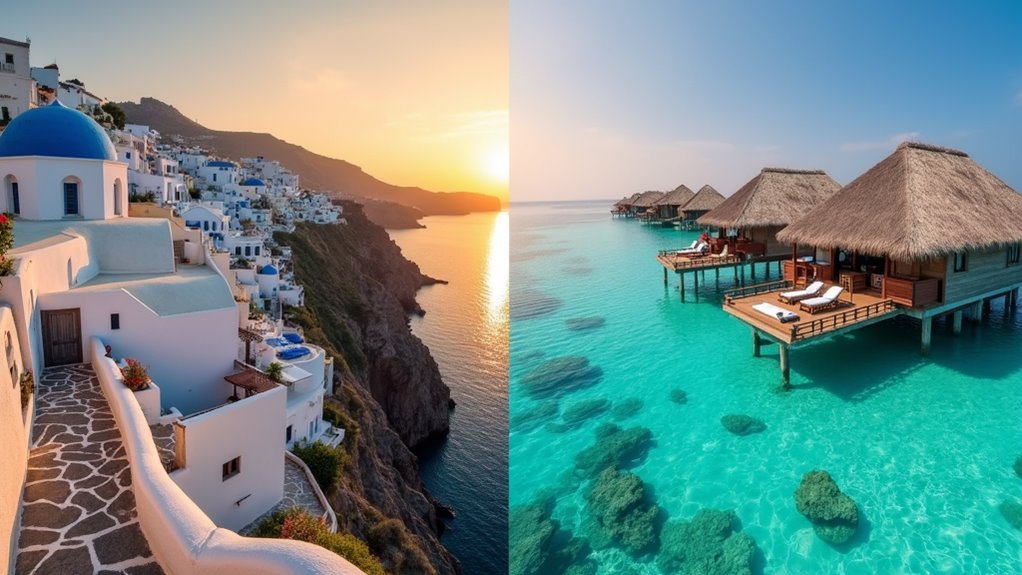
Your accommodation choice often defines your vacation experience as profoundly as the destination itself. Greece offers traditional Cycladic whitewashed structures with volcanic stone architecture, ranging from compact 100-square-foot guesthouses to 1,500-square-foot luxury cave suites carved into cliffs. Mykonos in particular is known for its premium price point compared to other Greek islands, but many visitors feel the experience justifies the cost.
In contrast, Maldives features engineering marvels—stilted villas built for tidal resilience with sizes from 1,100 to 2,500 square feet, typically spaced 50-100 meters apart for privacy. Many include glass floor panels for marine life viewing.
The price difference is substantial: Greek restored farmhouses start at €150-€300 nightly, while Maldivian overwater villas begin at $1,200-$2,500, plus mandatory seaplane transfers ($500-$800).
Both offer unique experiences—Greek properties include archaeological tours, while Maldives resorts bundle snorkeling equipment and sunset cruises. Many luxury travelers maximize their Maldives experience by using hotel loyalty points to significantly reduce accommodation costs while maintaining access to high-end amenities.
Deciding between Greece and the Maldives often hinges on whether you’re planning a family adventure or a romantic escape. Greece offers family-friendly destinations like Crete and the Ionian Islands with historical sites and gentle beaches. Meanwhile, the Maldives’ North Male and South Ari Atolls feature family resorts with marine activities.
For couples, Santorini’s picturesque landscapes contrast with the Maldives’ secluded overwater villas for ultimate privacy. Recent data shows Greece continuing to attract travelers with its cultural and natural appeal despite global uncertainties. Greece can also be a more budget-friendly option for travelers seeking European charm without breaking the bank.
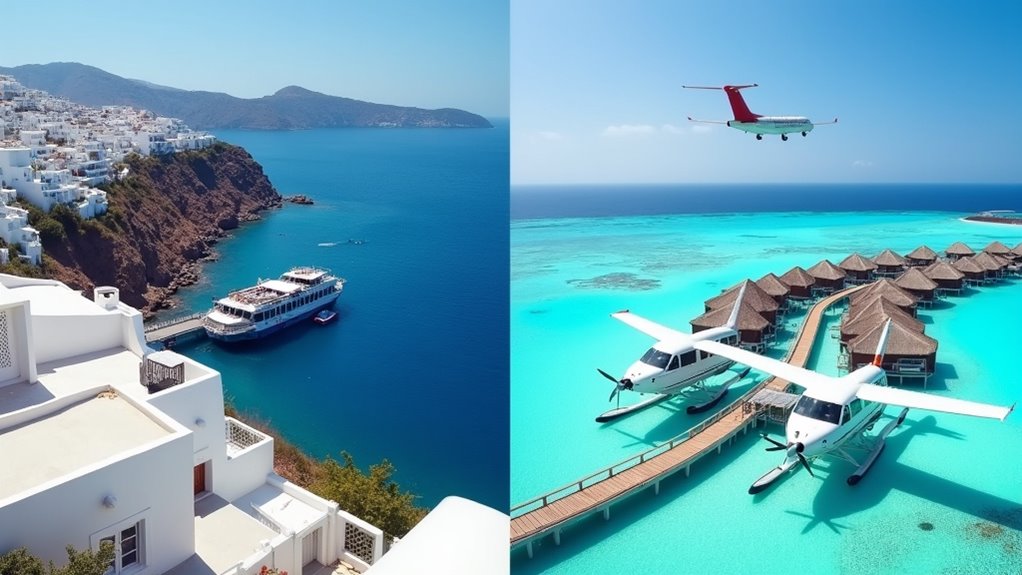
Traveling to either Greece or the Maldives requires strategic planning, especially when considering their vastly different accessibility profiles.
Strategic planning is non-negotiable when exploring the distinct accessibility landscapes of Greece and the Maldives.
The Maldives funnel all international arrivals through Velana Airport, requiring costly speedboat or seaplane transfers ($200-600 per person) to reach your resort. Once there, you’re fundamentally restricted to your island, with limited inter-resort travel options.
Greece offers far greater mobility freedom with multiple international airports, extensive ferry networks, and wheelchair-accessible public transportation in major cities. For those traveling with children, Greece provides family-friendly destinations throughout the mainland and islands. For visitors to Crete, Heraklion International Airport is conveniently located just 9.3 miles from the Maldives-inspired Stella Island Luxury Resort.
While the cobblestone streets of Santorini present challenges, Greece boasts over 100 beaches with accessibility ramps and mats.
For travelers with mobility concerns, Greece provides specialized tour operators, adaptive rental vehicles, and digital accessibility maps.
The Maldives offers gorgeous flat pathways within resorts but requires advance coordination for accessibility needs.
When comparing the environmental footprints of Greece and the Maldives, stark contrasts emerge in how these destinations manage their natural resources.
The Maldives implements a “one island, one resort” model with strict waste management protocols and advanced water treatment systems, while Greece struggles with coastal overdevelopment and lacks coordinated eco-tourism strategies. The Maldives’ economy and resilience depend critically on its blue natural assets, particularly its coral reef islands and marine biodiversity. While Greece offers beautiful seaside experiences, the Maldives provides magical evenings with nighttime activities that minimize environmental impact compared to traditional nightlife.
You’ll find distinct experiences in both destinations. Greece welcomes over 30 million visitors annually across its 6,000 islands, while the Maldives’ 1,200 islands see just 1.7 million travelers. Choose Greece for culture and diverse experiences, or Maldives for exclusive luxury and marine adventures. Consider your budget, preferred climate, and travel style to make the right choice for your perfect getaway.